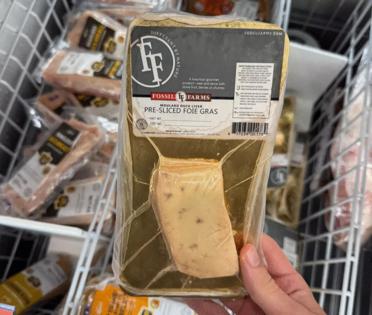Foie gras still on some store shelves in California, despite state ban
Published in News & Features
LOS ANGELES — Despite California's ban on foie gras, the pumped-up bird livers are being sold in Southern California stores.
Foie gras, which is made by force-feeding ducks and geese, was spotted by Times journalists this week on the shelves of Wild Fork Foods stores in Venice, Manhattan Beach and Westlake Village.
Ben Williamson, the executive director of the animal welfare organization Animal Outlook, said he learned that the product was being sold in California after having read several Yelp reviews, including one in which a buyer was pleasantly surprised to find foie gras at at a Wild Fork store.
"Sure was nice to buy some foie gras," the buyer wrote. "Did not think u could purchase it in California."
The pre-sliced moulard duck liver product sold at Wild Fork stores is packaged by Fossil Farms and was being sold for $10.98 per vacuum-packed container. The duck livers were sourced from La Belle Farms in New York, which is one the nation's largest producers of foie gras.
After The Times contacted Wild Fork Foods for comment, a Times journalist returned to two of the stores visited a day earlier and found that the foie gras was no longer on the shelves.
Wild Fork Foods didn't respond to requests for comment. Nor did its parent company, Brazil's JBS Foods, the world's largest meat packer.
Fossil Farms and La Belle Farms didn't respond to requests for comment.
Foie gras is produced by farmers who ram tubes down the throats of male ducks or geese and force feed them several times a day, swelling their livers to more than 10 times their natural size. The feedings also increase the organ's fat content — making it buttery and light for bird-liver connoisseurs.
The fowl are then slaughtered and their livers are sold as is, or whipped into a paste to spread on crackers or other food items. The animals are also typically confined to pens or cages in crowded farms.
"This systematic suffering for a so-called 'luxury' food product represents one of the most deliberate forms of animal cruelty in modern food production," Williamson said.
In 2004, California lawmakers passed Senate Bill 1520, which banned the production and sale of foie gras, described in the law as the "force feed[ing of] a bird for the purpose of enlarging the bird's liver beyond normal size."
The law went into effect in 2012 and has been challenged several times since on grounds including federal preemption, for violating the due process and commerce clauses of the U.S. Constitution and for being unconstitutionally vague.
The case has been declined for review by the U.S. Supreme Court twice, including as recently as 2023.
In 2020, a judge opened the door for out-of-state sales to individuals, but maintained the state's store and restaurant bans — as well as the prohibition against producing the gastronomical delicacy in the state. That decision, and the sales ban, was were reinforced by the Ninth Circuit in 2022.
The Los Angeles County district attorney's office is the designated law enforcement agency overseeing local sales of the liver product.
"California Health and Safety Code violations are enforced by local and state agencies that regulate businesses and various law enforcement or prosecuting agencies depending on the jurisdiction and whether the potential activity is criminal or civil in nature," the District Attorney's office said in a statement. "Our office does not comment on whether or not we are conducting an investigation."
Other state agencies that oversee various aspects of California's health and safety codes, including the Department of Public Health, the Department of Food and Agriculture and the state's Occupation Safety and Health Administration, said foie gras sales were not their purview.
"A product may not be sold in California if it is the result of force feeding a bird for the purpose of enlarging the bird's liver beyond normal size," said the office in a statement, reiterating the text of the law. "Violations are enforced by local jurisdictions."
State Attorney General Rob Bonta's office, which has defended the state ban in court, said local law enforcement often oversees these kinds of violations and declined to provide an interpretation of the law as it stands.
Williamson of Animal Outlook said such store sales of foie gras are rare in California. He suspects that the product may have "just slipped through the cracks" to end up on the shelves of Wild Fork.
He also noted that the Trump administration has taken issue with animal welfare laws, including seeking to overturn California's Proposition 12, which banned cages for egg-laying hens, gestation crates for pregnant pigs and veal crates for calves. That could suggest that the White House might be open to challenging California's foie gras ban, he said.
The White House didn't respond to a request for comment.
____
Times staff writers Corinne Purtill, Noah Haggerty and Sean Greene contributed to this report.
©2025 Los Angeles Times. Visit at latimes.com. Distributed by Tribune Content Agency, LLC.







Comments